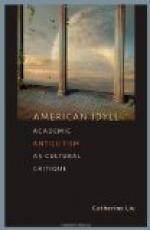And in conclusion, he states:—
“The dynamic psychology of to-day describes the present civilization as a repressive environment. For a great number of its inhabitants a sufficient self-expression is denied. There is, for those who care to see, a deep and growing unrest and pessimism. With the increase in knowledge is coming a new realization of the irrational direction of economic evolution. The economists, however, view economic inequality and life-degradation as objects in truth outside the science. Our value-concept is a price-mechanism hiding behind a phrase. If we are to play a part in the social readjustment immediately ahead, we must put human nature and human motives into our basic hypotheses. Our value-concept must be the yardstick to measure just how fully things and institutions contribute to a full psychological life. We must know more of the meaning of progress. The domination of society by one economic class has for its chief evil the thwarting of the instinct life of the subordinate class and the perversion of the upper class. The extent and characteristics of this evil are to be estimated only when we know the innate potentialities and inherited propensities of man; and the ordering of this knowledge and its application to the changeable economic structure is the task before the trained economist to-day.”
A little later I saw one of the big men who was at that Economic Association meeting, and he said: “I don’t see why Parker isn’t spoiled. He was the most talked-about man at the Convention.” Six publishing houses wrote, after that paper, to see if he could enlarge it into a book. Somehow it did seem as if now more than ever the world was ours. We looked ahead into the future, and wondered if it could seem as good to any one as it did to us. It was almost too good—we were dazed a bit by it. It is one of the things I just cannot let myself ever think of—that future and the plans we had. Anything I can ever do now would still leave life so utterly dull by comparison.
CHAPTER XVII
One of the days in Seattle that I think of most was about a month before the end. The father of a great friend of ours died, and Carl and I went to the funeral one Sunday afternoon. We got in late, so stood in a corner by the door, and held hands, and seemed to own each other especially hard that day. Afterwards we prowled around the streets, talking of funerals and old age.
Most of the people there that afternoon were gray-haired—the family had lived in Seattle for years and years, and these were the friends of years and years back. Carl said: “That is something we can’t have when you and I die—the old, old friends who have stood by us year in and year out. It is one of the phases of life you sacrifice when you move around at the rate we do. But in the first place, neither of us wants a funeral, and in the second place, we feel that moving gives more than it takes away—so we are satisfied.”




